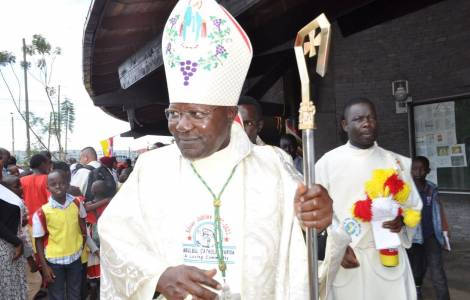
Nairobi (Agenzia Fides) - The Bishops of Kenya have sided with the young people who in recent weeks have taken to the streets in highly political demonstrations that go far beyond protesting against tax increases. The Archbishop of Nairobi, Philip Arnold Anyolo, in a message to young people delivered at the Basilica of the Holy Family on Saba Saba Day, a special day in the country when Kenyans remember the national protests of July 7, 1990 to demand free elections, praised young people for having overcome all tribal and partisan divisions: "Their struggle - he said - reminds us that we are united by a common good, our common humanity and our common identity as citizens of Kenya." "They only care that we all consider Kenya as something more important than our tribal affiliations and personal agendas," he added in another passage of his message to young people. "They ask us to be selfless, to think of others as ourselves, they ask us to go beyond the many borders and titles that separate us".
To better understand the situation in the African country from within, Fides Agency interviewed John Oballa Owaa, Bishop of Ngong, suffragan see of the archdiocese of Nairobi, which has about 250,000 baptized people out of 2 million inhabitants. "We are in the fifth week since protests broke out in various parts of the country and, for the moment, things seem to be returning to normal. The initiative desired by the protesters to maintain two days - Tuesday and Thursday - during which to keep demonstrations alive in various parts of the country, is still in place, but in a more modest tone. However, the appointment of August 8 has been confirmed for a large demonstration. Shops and offices are mostly open and operational. I can tell you with certainty that a part of the youth appreciates the changes implemented by the President (withdrawal of the much-contested tax bill and almost total reshuffle of the government, ed) and remains in a wait-and-see position".
The youth took to the streets with great courage, facing police charges and paying a high price: the toll published in a report by the Kenya National Commission on Human Rights (Knchr) contradicts the official figures published by the government and speaks of about 40 dead and 361 injured.
"They are young people who believe in their ideals and who raise valid questions. They bring to light the real problems of our society, the cost of essential consumer goods, taxes, corruption, the high unemployment rate even among those young people who have a highly qualified specialization and who, despite years and years of study, stay at home, without work. To achieve their just demands, many of them have paid the highest price with their lives, or have been injured. It is important to note at the same time that their protests have been successful: the previous executive was incompetent, based on tribal conceptions of power, and has been almost completely dismissed, the tax bill has been withdrawn, university fees are being reviewed... In short, the changes that have taken place give us hope". Leading members of the ecclesiastical community have shown solidarity with the young people and many have taken them as a reference. The commitment shown by so many young people in all corners of the country is seen by many as a seed of greater justice and social peace.
"Some of the representatives have achieved a high level of influence in society and receive great solidarity that goes far beyond divisions of class, origin and ethnicity. There is a great feeling of unity that aspires to make Kenya a better country, so we have made statements of support and have made commitments. We have also offered help and advice to the injured, to the families, and we reiterate a concept that is very dear to us: a multi-sector dialogue is necessary, as in a family where there is discontent, the best solution is to talk and listen to each other. We remain very close to the young people and we have started a process of dialogue between them and the political leaders.
In the societies of sub-Saharan Africa, young people constitute the vast majority, with cases where they are close to 80% of the population. Their demands are increasingly decisive in promoting processes of change. "We have shown the young people that our churches are open, we invite them to come and tell us their problems. They ask us not to invite politicians, not to be instrumentalized: churches are and must remain a sacred place and avoid, as has happened in some Catholic churches, becoming politicized. Of one thing we are sure, what these young people have unleashed will have enormous consequences and will bring about real changes: even in Uganda there have been demonstrations and the example of our Gen-Z is spreading to others. It is a seed that grows, courage and unity will bear fruit. In our societies, young people represent more than 70%, they are the ones who build the future. (L.A.) (Agenzia Fides, 31/7/2024)